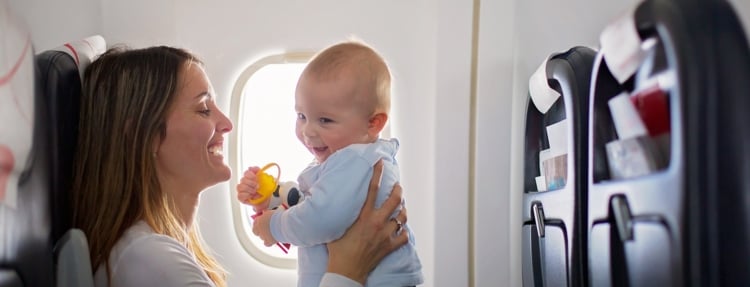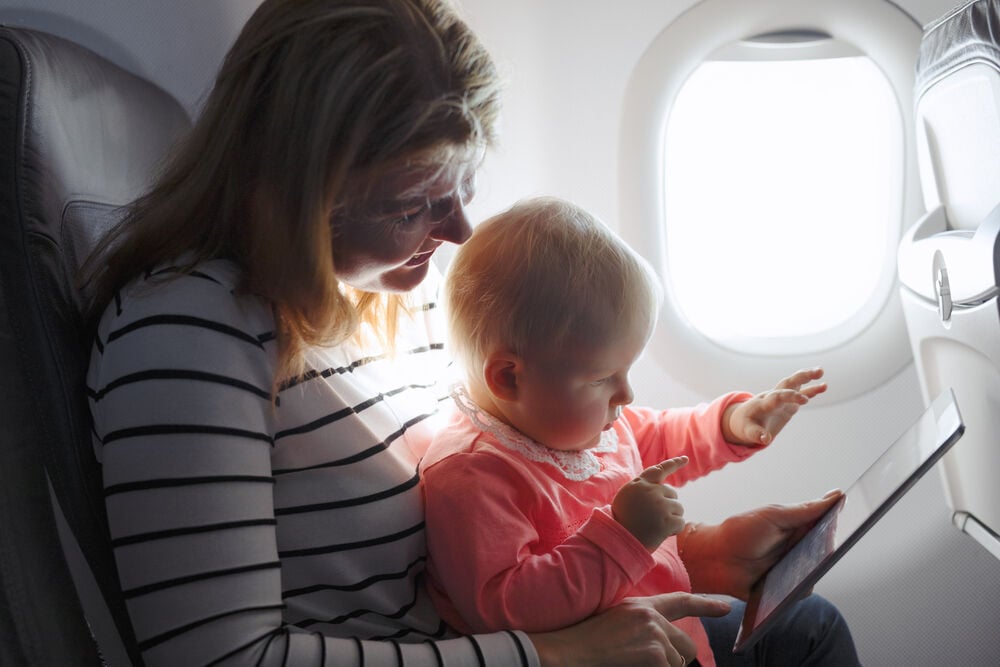-
Tracking cycle
-
Getting pregnant
-
Pregnancy
-
Help Center
-
Flo for Partners
-
Anonymous Mode
-
Flo app reviews
-
Flo Premium New
-
Secret Chats New
-
Symptom Checker New
-
Your cycle
-
Health 360°
-
Getting pregnant
-
Pregnancy
-
Being a mom
-
LGBTQ+
-
Quizzes
-
Ovulation calculator
-
hCG calculator
-
Pregnancy test calculator
-
Menstrual cycle calculator
-
Period calculator
-
Implantation calculator
-
Pregnancy weeks to months calculator
-
Pregnancy due date calculator
-
IVF and FET due date calculator
-
Due date calculator by ultrasound
-
Medical Affairs
-
Science & Research
-
Pass It On Project New
-
Privacy Portal
-
Press Center
-
Flo Accuracy
-
Careers
-
Contact Us
How to Fly With a Baby: Airplane Travel with Infants Explained


Every piece of content at Flo Health adheres to the highest editorial standards for language, style, and medical accuracy. To learn what we do to deliver the best health and lifestyle insights to you, check out our content review principles.
How to fly with a baby
Different airlines have different rules about flying with an infant. Some airlines allow a baby to fly when they're 2 days old. Others require babies to be at least 2 weeks old before flying. If you've recently had a cesarean section, some airlines will require a doctor's note after your 6-week checkup stating that you're fit to fly. It's a good idea to consult with your pediatrician and get their go-ahead before buying the tickets.
Make sure to call the airline and check their requirements before you buy a ticket. Once you have your ticket, you can make seating arrangements for your baby with the airline. Some airlines offer in-flight cots during long-haul flights, and others allow you to bring your baby's car seat with you.
For their first few years, your baby isn't old enough to fly in a regular airplane seat. For shorter flights, babies under 2 years old can sit on an adult's lap, and you don't have to buy them their own ticket. If you're going to place them in a car seat, they will need their own ticket.
Traveling with an infant
There are certain precautions that you need to take when traveling with a baby, but overall, flying is just as safe for babies as it is for adults. The only exception is for very young infants less than 7 days old. Studies have found that infants this young could find it difficult to adjust to the variations in cabin pressure.
To prepare for airplane travel with your baby, we recommend the following steps:
- Notify the airline in advance if your baby has any food allergies. Airlines will be accommodating if your child has any food allergies, such as nut allergies or lactose intolerance. The airline can arrange an appropriate meal for your child (if they're a bit older), and flight attendants may ask other passengers to refrain from eating the food that your baby is allergic to during the flight. Food particles can get into the air-circulating system and cause allergic reactions, even if your child isn't the one eating the food.
- Protect your baby's ears during the flight. Small children have delicate ears, and the changes in cabin pressure can cause earaches. To avoid this, breastfeed your baby or give them a bottle or a pacifier during takeoff and landing.
Remember to check with your doctor
If you're traveling with an infant on a plane, it's always wise to ask your doctor for recommendations. Your doctor can also make sure your child's vaccinations are up to date before you travel. They might recommend that you avoid traveling to places where your baby could be exposed to illnesses that they can't be vaccinated against yet. For example, babies younger than 6 months old can't be vaccinated against yellow fever.
You should also talk to your doctor if your child has a chronic illness. Most airlines will make special arrangements for your child if needed. For example, they can usually provide oxygen during the flight and layovers, as long as you notify the airline at least 24 hours in advance.
If your child is older than two and experiences motion sickness, your doctor might recommend anti-nausea medications. These medications are usually sold over the counter, but your doctor will specify the correct dosage for your child.
Airplane travel with a baby: a parents' checklist
Flying with a baby can make anyone nervous. Follow this checklist to make sure that you're not forgetting anything!
Things to do before the flight
- Contact the airline to make seating arrangements for your child.
- Notify the airline if your child has any food allergies.
- Make sure your child's vaccinations are up to date.
- Ask your doctor for nausea medication if your child experiences motion sickness.
- Notify the flight attendants if your child has any disease.
- If your child is old enough, explaining that you'll be taking a trip can help prevent anxiety.
- Check with the airline about what you can bring in checked and carry-on luggage.
- Pack extra clothes for you and the baby in your carry-on luggage.
- Get to the airport early.
Take a quiz
Find out what you can do with our Health Assistant
What seats to book
When you're flying with an infant, the best seats are the ones furthest from the aisle. That way, your child won't be disturbed by people trying to move around you to get to the aisle. Especially if your child is in a car seat, having other people trying to get past can be uncomfortable for everyone.
On board with a baby: what you should know
It's normal to worry about whether your child will cry and make other passengers uncomfortable. The truth is, though, flight attendants and passengers are probably used to it. Many of the people on the plane will have flown with babies on board before, and they'll be sympathetic and understanding. Be polite, and if someone offers help, feel free to accept it if you need a break. Don't worry; a lot of people have been in your situation at some point.
Flying with a baby: 5 tips to follow

- Consider booking a flight that coincides with your baby's nap schedule.
- Pack some healthy, age-appropriate snacks for your baby.
- Bring entertainment activities on board with you.
- Pace the aisles if your baby is fussy.
- Stay calm.
If you're going to be flying with a baby, preparation is key. As long as you prepare before your flight, you'll realize that you didn't have anything to worry about. Very soon, you'll be the one teaching other parents how to fly with a baby!


Hey, I'm Anique
I started using Flo app to track my period and ovulation because we wanted to have a baby.


The Flo app helped me learn about my body and spot ovulation signs during our conception journey.


I vividly
remember the day
that we switched
Flo into
Pregnancy Mode — it was
such a special
moment.
Real stories, real results
Learn how the Flo app became an amazing cheerleader for us on our conception journey.




